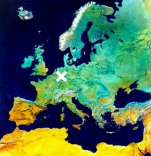
Neunkirchen's location

Neunkirchen's location |
Politically, the area 'first' belonged to a Catholic convent in Cologne. In 1365, the Counts of Berg took control until in 1815, their territory became Prussian and as such part of the newly founded German Empire in 1871.
After the failed revolution of 1848, emigration (primarily to America) was common all over the country. Neunkirchen, too, was left by a considerable number of people (among them about 70 descendants of Peter Heinrich Herchenbach). Population further declined in the late 19th century, when industrialization provided jobs in the Rhine valley, making Neunkirchen even less attractive in comparison.
After World War II, the town could again report increases in population, with the whole municipality now numbering over 21 000 in 59 villages spread on an area of 20 sq mi. One important feature of contemporary Neunkirchen is the “Wahnbach” reservoir, a 1-sq-mi artificial lake containing 11 bn gallons of water, supplying hundreds of thousands of people with drinking water.
